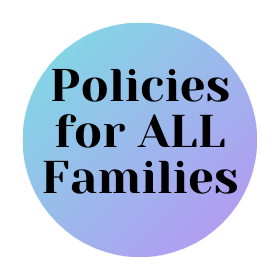
Campaign for Inclusive Family Policies
Introduced by Family and Home Network in 2003, the Campaign for Inclusive Family Policies has grown out of decades of work and communication with tens of thousands of parents. It aims to establish this fundamental principle: family policy must include all families.
Summary
Families are diverse and they use diverse and dynamic strategies to meet their income-earning and caregiving responsibilities. All caregiving has value, whether it’s done by family members or paid providers. Care must be equitably supported by government policies. In order to craft flexible, equitable policies, policymakers must make a paradigm shift: reject the “working families” lens (parents doing waged work, children in child care), and instead adopt principles of inclusion, ensuring that care of all kinds is funded.
Speak Up! Call on the president, vice president, and members of Congress: Make family policies for ALL families.
Learn more about the Campaign for Inclusive Family Policies:
Families with children make diverse choices about income-earning and the care of their children. Reliable data shows that a majority of parents of infants and young children prefer to provide care themselves or share caregiving with their spouse, other family members, or another trusted person, or utilize part-time preschool or part-time paid care. Most families modify their caregiving choices over the years as the needs of their family members change, sometimes in predictable ways, other times due to unexpected circumstances. Facing complex decisions, parents weigh their children’s needs, their own values and desires, as well as financial and career considerations. Grandparents who are raising grandchildren face challenges that also differ greatly from one family to another. Families who care for an adult with special needs and/or a frail elder face similarly complex decisions about how to provide care. Flexibility, choice and financial support of care is critically important to us all.
For over five decades, U.S. family policy has been crafted through the lens of “working families”—a term whose meaning is not well-defined. With public information campaigns and lobbying, advocates for “working families” have succeeded in capturing policymakers’ concern. Many policies crafted for “working families” support parents and other caregivers in the paid workforce but ignore parents who forgo or cut back on paid employment in order to care for their children.
Advocates for “working families” raise millions of dollars every year from a variety of sources including labor unions, child care and elder care businesses, women’s rights advocacy organizations and corporations—all of which have economic and/or ideological interests in keeping people on the job. There is no profit to be made when unpaid family members provide care, and although a few grassroots organizations speak up on behalf of family caregivers, their modest financial resources make for a very lopsided debate. It’s important to recognize this decades-long imbalance of power and resources in family policy discussions.
Child care funding is an example of inequitable policies. Child care services are supported by billions of dollars in funding and by tax credits. Yet the value of care when parents or grandparents do it is ignored and unsupported. Surveys of parents with infants and young children show that many do not use child care services. These families might provide caregiving by having one parent forgo paid employment, by “tag teaming” (scheduling different hours of employment), by having flextime for income-earning work, and even by having babies accompany them while they work. Some families make intergenerational caregiving arrangements, in which multiple adults are doing paid work and also taking turns caregiving. In recent years, due in part to the opioid crisis, a growing number of grandparents have stepped in as primary caregivers, and they, too, have differing needs and preferences as they provide care. Families with employed parents who utilize care services for their children can qualify for federal and state Child Tax Credits, Dependent Care Tax Credit, or child care subsidies. Yet when parents (or grandparents) care for a child, public policies fund that care at $0.
This is not a campaign against “working families”—it is a campaign for helping the greatest possible number of families, regardless of how they manage their income-earning and caregiving responsibilities. In short, it is a call for inclusion.
It's time for a paradigm shift, for the policymaking lens to turn to supporting care—in all the diverse ways people meet this essential need.
We call on policymakers to embrace core values of equity and justice and make policies for ALL. By adopting principles of inclusion and funding all kinds of care, legislators would take a major step toward crafting straightforward, equitable and flexible policies.
Catherine H. Myers - Executive Director Family and Home Network


